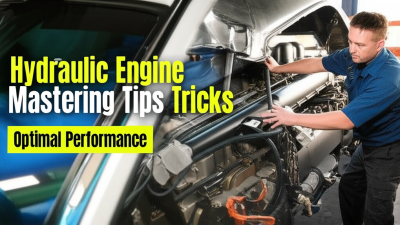Ultimate Guide to Mastering the Best Hydraulic Engine: Tips and Tricks for Optimal Performance
In the world of heavy machinery and automotive performance, mastering the intricacies of a Hydraulic Engine can significantly enhance your operational efficiency and effectiveness. This ultimate guide is designed for enthusiasts and professionals alike, offering invaluable tips and tricks that will help you unlock the full potential of your Hydraulic Engine. Whether you are looking to improve its overall performance, extend its lifespan, or troubleshoot common issues, our comprehensive resources will provide step-by-step insights and practical solutions. Dive into the fascinating mechanics of hydraulic systems, explore best practices for maintenance, and learn how to harness their power to achieve optimal performance in various applications. Get ready to elevate your expertise with techniques that will transform your understanding and usage of the Hydraulic Engine.
Understanding the Basics of Hydraulic Engine Technology for Beginners
Understanding the basics of hydraulic engine technology is essential for beginners eager to grasp the intricacies of this powerful system. Hydraulic engines operate on the principle of fluid mechanics, using pressurized fluid to generate force and motion. According to a report by MarketsandMarkets, the global hydraulic equipment market is expected to reach $65 billion by 2026, reflecting the growing reliance on hydraulic technology in various sectors. This increasing demand highlights the importance of understanding how these engines work, particularly for those seeking careers in engineering or equipment operation.
At the core of hydraulic engine technology is the hydraulic fluid, typically mineral oil, which transfers power throughout the system. The efficiency of a hydraulic engine is greatly influenced by factors such as fluid viscosity and temperature. A study conducted by the American Society of Mechanical Engineers (ASME) reveals that maintaining optimal fluid conditions can enhance performance by up to 15%. This emphasizes the need for beginners to learn about proper maintenance practices, such as regular fluid checks and temperature monitoring, to ensure their hydraulic engines operate at peak efficiency.
Key Features to Look for in the Best Hydraulic Engines
When selecting the best hydraulic engine, understanding the key features that contribute to optimal performance is crucial. One of the most important factors to consider is the engine’s power-to-weight ratio. According to a report from the Hydraulic Institute, engines with a higher power density can provide enhanced efficiency without compromising on performance, making them preferable for both industrial and mobile applications.
Another critical feature to look for is the hydraulic system's control accuracy. Precision in hydraulic control can significantly influence the operational longevity of the engine and attachments. Data from a recent market analysis indicates that advanced hydraulic engines with electronically controlled systems can improve responsiveness by up to 30%, allowing for smoother operation and reduced wear on components. Additionally, thermal efficiency plays a vital role; engines designed with optimal heat dissipation systems can operate for extended periods without overheating, enhancing durability and productivity in demanding environments.
Investing in a hydraulic engine that incorporates these features ensures not only superior performance but also long-term reliability and cost-effectiveness in your operations.
Essential Maintenance Practices for Long-lasting Hydraulic Performance
When it comes to maintaining the optimal performance of a hydraulic engine, routine maintenance practices are essential. These strategies not only prolong the lifespan of your equipment but also enhance its efficiency. One of the most critical aspects is regularly checking and changing the hydraulic fluid. Contaminated fluid can lead to poor performance and potential damage. Aim to inspect the fluid levels weekly and replace the oil based on the manufacturer’s recommendations, ensuring your engine runs smoothly.
Another important practice is to keep the hydraulic system clean. Dirt and debris can significantly impair the system's functionality. Regularly inspect and clean the filters, as well as the reservoir, to prevent any buildup. Consider implementing a schedule for cleaning, so it becomes a regular part of your maintenance routine. This simple tip can help prevent costly repairs and downtime.
Lastly, always pay attention to leaks. A small leak can quickly escalate into a larger issue if not addressed promptly. Conduct routine inspections for any signs of fluid leakage around hoses and connections. If you notice any leaks, rectify them immediately to maintain the integrity of your hydraulic engine. By incorporating these essential maintenance practices, you can ensure optimal performance and longevity of your hydraulic system.
Ultimate Guide to Mastering the Best Hydraulic Engine: Tips and Tricks for Optimal Performance - Essential Maintenance Practices for Long-lasting Hydraulic Performance
| Maintenance Practice |
Frequency |
Benefits |
Common Tools Needed |
| Fluid Level Inspection |
Weekly |
Prevents overheating and wear |
Dipstick, funnel |
| Filter Replacement |
Every 3 months |
Improves fluid quality |
Wrench, new filter |
| Seal Inspection |
Monthly |
Helps prevent leaks |
Inspection mirror, replacement seals |
| Hydraulic Fluid Change |
Annually |
Enhances performance and longevity |
Drum, pump |
| System Leak Check |
Bi-Monthly |
Prevents performance loss |
Soapy water, inspection tools |
Advanced Tips for Troubleshooting Common Hydraulic Engine Issues
Hydraulic engines are powerful machines that require meticulous attention to maintain their optimal performance. When issues arise, it’s often the small, overlooked details that can lead to major malfunctions. One common problem is air contamination within the hydraulic fluid, which can cause erratic performance and potential system failure. To troubleshoot this issue, ensure that all connections are secure and inspect the hydraulic fluid for any signs of foaming or bubbles. Regularly change the fluid as per the manufacturer's guidelines to avoid this problem altogether.
Another frequent issue is overheating. Hydraulic engines generate significant heat, and if not properly managed, can lead to catastrophic failure. To combat overheating, check the cooling system and ensure that it is functioning correctly. Regularly clean or replace any filters to prevent blockages that can impede fluid flow. Additionally, monitor the system for leaks, as low fluid levels can contribute to overheating and further exacerbate performance issues. By staying vigilant and adhering to these advanced troubleshooting tips, you can enhance the longevity and efficiency of your hydraulic engine.
Hydraulic Engine Performance Metrics
Maximizing Efficiency: How to Get the Most Out of Your Hydraulic Engine
When it comes to maximizing the efficiency of your hydraulic engine, understanding its core components and functionality is crucial. Start by ensuring that all fluid levels are adequate and that you are using the correct hydraulic fluid as recommended by the manufacturer. Regular maintenance, including fluid changes, filter replacements, and leak checks, can significantly enhance the long-term performance of the engine. Additionally, keeping the hydraulic system clean from debris and contaminants not only helps prevent wear and tear but also ensures smoother operation.
Another key aspect to consider is the adjustment of pressure settings. Properly calibrated pressure levels allow your hydraulic engine to operate at optimal efficiency while avoiding unnecessary strain. Familiarize yourself with the specific pressure requirements for various tasks and adjust them accordingly. Lastly, investing in high-quality components—such as hoses, pumps, and valves—can lead to better reliability and performance. By combining these practices, you’ll not only increase the lifespan of your hydraulic engine but also enjoy improved efficiency and productivity in your operations.

